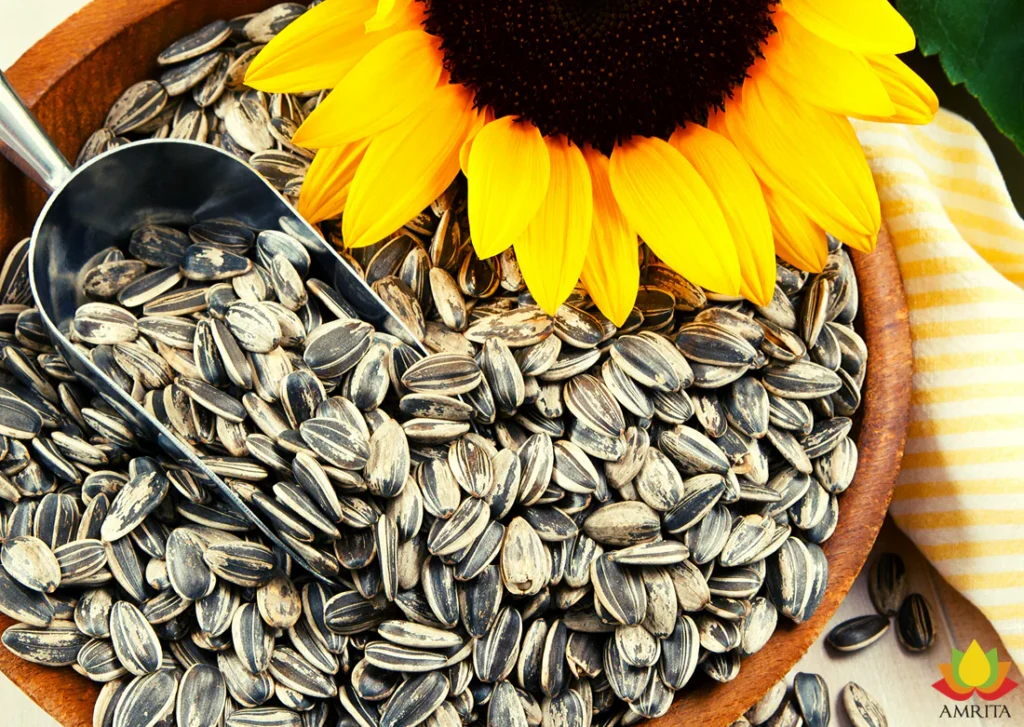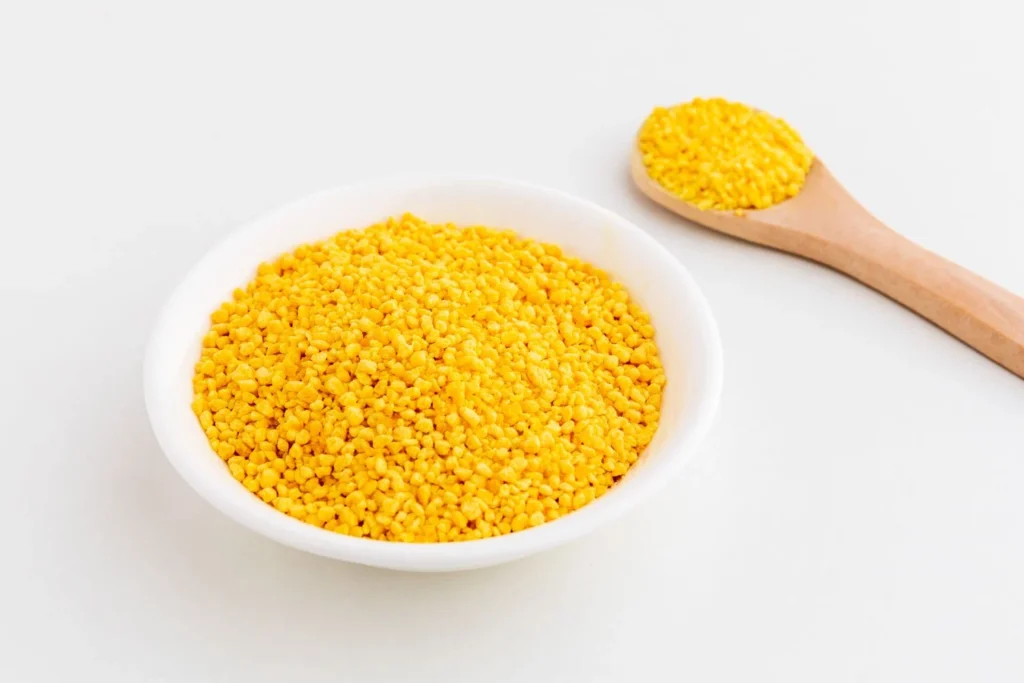좋아하는 아몬드 우유, 새로운 단백질 바 또는 좋아하는 비건 초콜릿의 성분 목록에서 본 적이 있을 것입니다. '해바라기 레시틴'이라는 용어가 곳곳에 등장하면서 건강에 관심이 많은 소비자들은 간단한 의문을 품게 됩니다: 이것이 내가 기대해야 할 것인가, 아니면 또 다른 가공된 필러일 뿐인가?
혼란스럽다면 혼자가 아닙니다. 온라인 정보는 모호하고 상충되는 경우가 많습니다.
이 가이드는 잡음을 차단하기 위해 작성되었습니다. 해바라기 레시틴의 정의, 효능에 대한 과학적 근거, 안전성 프로파일, 그리고 가장 중요한 고품질 제품을 선택하는 방법까지 명확하고 근거에 기반한 정보를 제공합니다.
해바라기 레시틴이란? 필수 천연 성분에 대한 설명
해바라기 레시틴은 합성 첨가물이 아니라 우리 몸과 음식에서 중요한 역할을 하는 천연 지방 화합물입니다. 보충제라기보다는 근본적인 기능성 성분이라고 생각하세요.
간단히 말해서: 우리 몸의 모든 세포에 필수적인 성분
레시틴은 인지질이라고 하는 지방 물질을 통칭하는 용어입니다. 인지질은 단순한 지방이 아니라 우리 몸의 모든 세포막을 구성하는 필수 성분입니다. 인지질은 세포의 구조와 기능을 유지하기 위해 각 세포에 들어오고 나가는 물질을 조절하는 '문지기' 역할을 합니다. 해바라기 레시틴은 바로 이 중요한 물질을 해바라기 씨에서 직접 추출한 것입니다. 특히 필수 영양소 콜린의 주요 공급원인 포스파티딜콜린이라는 주요 인지질이 풍부하게 함유되어 있습니다.
어떻게 만들어지나요? 콜드 프레스 추출의 중요한 차이점
해바라기 레시틴의 인기가 높아지는 가장 중요한 이유 중 하나는 다음과 같습니다. 어떻게 만들어집니다. 이 과정은 일반적으로 화학적 방식이 아닌 기계적 방식으로 이루어집니다. 해바라기씨를 탈수하여 기름, 껌, 고체로 분리하는 것으로 시작됩니다. 그런 다음 레시틴은 고품질 올리브 오일을 만드는 방식과 유사하게 냉압착 시스템을 통해 추출되는 껌 물질의 일부입니다.
이는 헥산과 같은 화학 용매를 사용하여 추출하는 대두 레시틴과는 완전히 대조적인 방식입니다. 콜드 프레스 방식은 독한 화학 물질을 사용하지 않기 때문에 더 깨끗하고 자연스러운 최종 제품을 만들 수 있습니다.
식품 라벨에 표시되는 이유: 천연 유화제로서의 역할에 대한 이해
해바라기 레시틴이 성분 목록에 있는 경우, 보통 유화제로서의 강력한 특성 때문에 포함되어 있습니다. 유화제는 기름과 물처럼 일반적으로 섞이지 않는 두 가지 물질을 섞는 데 도움이 되는 물질입니다.
음식의 궁극적인 피스메이커라고 생각하세요. 초콜릿 바에서는 코코아 버터와 코코아 고형물이 완벽하게 섞이도록 하여 하얗고 백악질 같은 막이 생기는 것을 방지합니다. 샐러드 드레싱에서는 오일과 식초가 분리되는 것을 막아줍니다. 제빵 제품에서는 더 부드럽고 균일한 식감을 만들어줍니다. 천연 비알레르기성 유화제로서의 효과 덕분에 "클린 라벨"을 지향하는 브랜드에서 선호합니다.
해바라기 레시틴의 7가지 주요 건강 효능(증거 기반)
해바라기 레시틴의 건강상의 이점은 주로 세포의 구성 요소이자 필수 영양소의 공급원 역할을 하는 고농도의 유익한 인지질과 관련이 있습니다.
- 두뇌 건강: 기억력 및 인지 기능 지원 해바라기 레시틴은 기억력, 학습 및 기분 조절에 필수적인 신경전달물질인 아세틸콜린을 생성하는 데 사용되는 포스파티딜콜린의 풍부한 공급원입니다. 연구에 따르면 적절한 콜린 섭취는 인지 능력 향상과 관련이 있으며 노화와 관련된 인지 기능 저하를 예방하는 데 도움이 될 수 있다고 합니다.
- 심장 건강: 콜레스테롤 관리에서 심장 건강의 역할 레시틴의 유화 특성은 우리 몸에도 적용됩니다. 레시틴은 지방과 콜레스테롤을 분해하여 신체가 이를 더 쉽게 처리하고 배설할 수 있도록 도와줍니다. 일부 연구에 따르면 레시틴 보충제는 LDL("나쁜") 콜레스테롤 수치를 낮추고 HDL("좋은") 콜레스테롤 수치를 높여 전반적인 심혈관 건강에 도움이 될 수 있다고 합니다.
- 모유 수유 지원: 막힌 유관을 위한 천연 보조제 많은 수유 컨설턴트와 국제 모유 수유 연맹과 같은 단체에서 추천하는 해바라기 레시틴은 모유 수유를 하는 엄마들이 널리 사용하는 제품입니다. 해바라기 레시틴은 모유의 점도(끈적임)를 감소시켜 유관이 막힐 가능성을 낮추는 작용을 하는 것으로 알려져 있습니다.
- 간 기능: 지방 대사 및 회복 지원 간에는 인지질이 풍부합니다. 포스파티딜콜린은 지방의 운반과 대사를 도와 과도한 지방 축적으로부터 간을 보호하는 데 도움이 됩니다. 이는 간 건강에 유익할 수 있으며 간 세포의 회복에 도움이 될 수 있습니다.
- 남성 건강: 구체적인 이점 해바라기 레시틴의 콜린은 전립선 건강을 지원하고 테스토스테론 합성에 관여합니다. 또한 심장 건강과 인지 기능에 대한 이점은 특히 나이가 들어감에 따라 남성에게 중요합니다.
- 신경 보호: 수초의 중요성: 미엘린 시스의 중요성 인지질은 신경 섬유를 둘러싸고 있는 보호 코팅인 미엘린 수초의 중요한 구성 요소입니다. 이 수초는 신경 신호가 빠르고 효율적으로 전달되도록 합니다. 이러한 지방을 건강하게 섭취하면 신경계의 무결성을 유지할 수 있습니다.
- 피부 보습 및 장벽 기능 레시틴은 천연 연화제로서 피부 진정과 보습에 도움이 될 수 있습니다. 인지질을 섭취하면 건강한 피부 세포를 위한 구성 요소를 제공하여 피부의 자연 장벽을 강화하고 수분을 유지하는 데 도움이 됩니다.
해바라기 레시틴 대 대두 레시틴: 확실한 비교
둘 다 레시틴이지만, 공급과 생산에 있어 중요한 차이점이 있기 때문에 많은 사람이 해바라기 레시틴을 선호합니다.
궁극의 비교표
| 기능 | 해바라기 레시틴 | 대두 레시틴 |
|---|---|---|
| 출처 | 해바라기 씨앗 | 대두 |
| 추출 | 냉간 압착(기계식) | 화학 용제(예: 헥산) |
| GMO 위험 | 매우 낮음(해바라기는 일반적으로 유전자 변형되지 않음) | 높음(대부분의 대두는 유전자 변형) |
| 알레르겐 프로필 | 대부분의 사람에게 무알레르기 | 대두는 주요 알레르기 유발 물질입니다. |
| 식물성 에스트로겐 | 없음 | 이소플라본(식물성 에스트로겐) 함유 |
심층 분석 1: 추출 방법(콜드 프레스 대 화학 용매)
앞서 언급했듯이 해바라기 레시틴은 깨끗한 냉압착 추출 방식으로 대두 레시틴 생산과 관련된 화학 잔류물을 피할 수 있습니다. 이는 가능한 한 가장 자연적인 제품을 찾는 소비자에게 매우 중요한 요소입니다.
심층 분석 2: 식물성 에스트로겐과 호르몬 우려에 대한 진실
이것이 차별화의 주요 포인트입니다. 대두에는 체내 에스트로겐 호르몬을 모방할 수 있는 화합물인 이소플라본(식물성 에스트로겐)이 자연적으로 함유되어 있습니다. 이는 일부 개인에게 우려의 대상입니다. 해바라기에는 이러한 화합물이 포함되어 있지 않습니다. 따라서 대두와 관련된 호르몬 우려는 해바라기 레시틴에는 적용되지 않습니다.
안전성 프로필, 부작용 및 권장 복용량
해바라기 레시틴은 일반인에게도 안전한 것으로 널리 알려져 있습니다.
얼마나 안전한가요? (FDA 및 과학적 합의의 증거)
레시틴은 미국 식품의약국(FDA)에서 식품에 사용할 수 있는 "일반적으로 안전하다고 인정되는 성분"(GRAS)으로 지정되어 있습니다. 보충제로서 권장 용량으로 섭취할 경우 부작용의 위험이 낮고 오랫동안 안전하게 사용되어 왔습니다.
잠재적 부작용 및 주의해야 할 대상
해바라기 레시틴을 과다 복용하면 복부 팽만, 설사, 복부 불편감 등 가벼운 소화기 부작용이 발생할 수 있습니다. 이러한 부작용은 표준 복용량에서는 드물게 발생합니다. 다른 보충제와 마찬가지로, 특히 임신 중이거나 수유 중이거나 기저 질환이 있는 경우 섭취하기 전에 의사와 상담하는 것이 좋습니다.
해바라기 레시틴은 염증을 유발할까? 연구 결과 살펴보기
이것은 일반적인 질문입니다. 해바라기 레시틴은 오메가-3보다 오메가-6 지방산 함량이 더 높습니다. 오메가6가 지나치게 많은 식단은 염증을 촉진할 수 있지만, 레시틴 보충제를 통해 섭취하는 양은 매우 적기 때문에 대부분의 사람들에게는 이러한 균형에 부정적인 영향을 미치지 않습니다. 레시틴의 주요 구성 성분인 인지질은 세포막 건강에 필수적이며, 이러한 맥락에서 염증 유발 물질로 간주되지 않습니다.
사용 사례에 따른 일반적인 복용량 지침
복용량은 목표에 따라 다릅니다.
- 일반 건강: 하루 1,200~2,400mg.
- 모유 수유(덕트 막힘): 수유 전문가들은 하루 3~4회, 1,200mg을 섭취할 것을 권장합니다.
- 콜레스테롤 관리: 연구에 따르면 하루 500mg에서 2,000mg의 용량을 사용했습니다.
면책 조항: 항상 가장 낮은 유효 용량으로 시작하고 의사와 상의하여 특정 필요에 맞는 적절한 양을 결정하세요.
현명한 소비자를 위한 해바라기 레시틴 선택 가이드
모든 보충제가 똑같이 만들어지는 것은 아닙니다. 고품질의 제품을 선택하는 방법을 알아보세요.
분말, 액상, 캡슐? 라이프스타일에 맞는 결정 매트릭스
| 캡슐 | 액체 | 파우더 | |
|---|---|---|---|
| 바쁜 전문가 | 훌륭합니다. 편리하고, 맛이 없고, 여행하기 쉽습니다. | 좋습니다. 커피에 첨가할 수 있지만 덜 편리합니다. | 보통. 혼합이 필요하며 이동 중에 지저분해질 수 있습니다. |
| 피트니스 애호가 | 좋습니다. 다른 보충제와 함께 복용하기 쉽습니다. | 훌륭합니다. 단백질 셰이크와 스무디에 쉽게 섞어 드세요. | 훌륭합니다. 셰이크에 첨가하는 데 가장 적합하며 대량 구매 시 가장 비용 효율적입니다. |
| 홈 베이커/요리사 | Poor. 레시피에서 사용할 수 없습니다. | 훌륭합니다. 드레싱이나 제빵과 같은 레시피에 쉽게 계량하고 통합할 수 있습니다. | 좋습니다. 레시피에서도 잘 작동하지만 식감에 약간의 영향을 줄 수 있습니다. |
고품질 제품 식별을 위한 5가지 체크리스트
- 냉압착 추출: 라벨에는 냉압착 방식이며 화학 용매를 사용하지 않았다고 명시되어 있어야 합니다.
- Non-GMO 인증: 유전자 변형이 없는 해바라기로 만든 제품인지 확인하려면 Non-GMO 프로젝트 인증 마크가 있는지 확인하세요.
- 타사 테스트 완료: 평판이 좋은 브랜드는 독립적인 연구소에서 제품의 순도와 효능을 테스트합니다.
- 인지질 함량이 높습니다: 보충제 성분표에는 포스파티딜콜린과 같은 주요 인지질의 농도가 이상적으로 명시되어 있어야 합니다.
- 최소한의 기타 성분: 제품은 필러나 인공 첨가물이 거의 없는 순수한 해바라기 레시틴이어야 합니다.
제품 라벨을 읽고 이해하는 방법
"보충제 정보" 패널을 확인합니다. "1회 제공량"과 "1회 제공량당 양"을 확인합니다. 성분 목록이 깨끗하고 위의 품질 체크리스트와 일치하는지 확인합니다.
자주 묻는 질문
질문: 일반적으로 효과를 보는 데 얼마나 걸리나요?
A: 상황에 따라 다릅니다. 막힌 관과 같은 문제의 경우, 일부 여성은 24-48시간 이내에 증상이 완화된다고 보고합니다. 인지 기능이나 콜레스테롤 개선 효과를 보려면 몇 주 동안 꾸준히 사용해야 할 수도 있습니다.
질문: 해바라기 레시틴을 다른 보충제와 함께 섭취해도 되나요?
A: 예, 일반적으로 대부분의 다른 보충제와 함께 복용해도 안전한 것으로 간주됩니다. 심지어 비타민 A, D, E, K와 같은 지용성 비타민의 흡수를 향상시킬 수도 있습니다.
질문: 공복에 복용해야 하나요?
A: 음식과 함께 또는 음식 없이 섭취할 수 있지만 식사와 함께 섭취하면 소화 장애를 예방하는 데 도움이 될 수 있습니다.
Q: 해바라기 레시틴이 체중 증가를 유발할 수 있나요?
A: 지방이긴 하지만 보충제로 섭취하는 양은 매우 적으며 체중 증가에 기여하지 않습니다. 지방 대사에서 지방의 역할은 실제로 건강한 체중을 유지하는 데 도움이 될 수 있습니다.
결론
해바라기 레시틴은 식품 라벨에서 발음하기 어려운 성분 그 이상입니다. 해바라기 레시틴은 깨끗한 천연 원료에서 추출한 다재다능하고 유익한 화합물입니다. 콩에 비해 우수한 비알레르기성, 유전자 변형 성분이 없는 해바라기 레시틴은 두뇌 건강 개선부터 모유 수유모 지원까지 모든 면에서 탁월한 선택이 될 수 있습니다.
이 강력한 영양소가 어떻게 만들어지는지, 어떤 효능이 있는지, 고품질 제품을 선택하는 방법을 이해하면 이 영양소가 건강 도구 키트에 포함될 가치가 있는지 자신 있게 결정할 수 있습니다.



